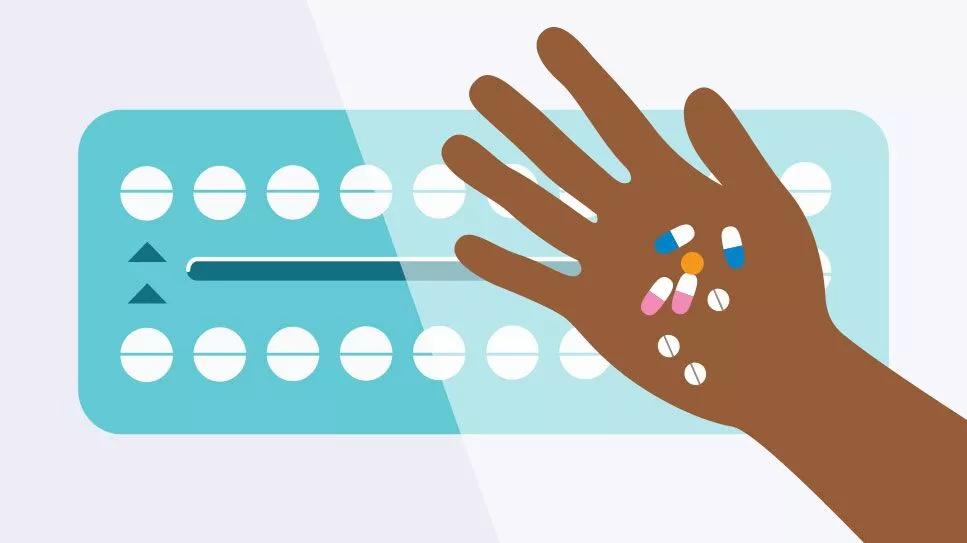Certain seizure medications, HIV treatments, antibiotics or herbal supplements can make your oral contraception less effective

Image content: This image is available to view online.
View image online (https://assets.clevelandclinic.org/transform/740b18ea-3c8f-4b79-8388-d921f917f884/birth-control-pills-1351285279)
Birth control pack, with an overlay of a hand holding other pills and tablets
Some medications don’t play nicely together. One might make the other less effective. For example, you may use hormonal contraceptives (birth control). If you need another medication for an illness or health condition, you may wonder if the medicine will affect how well your birth control works.
Advertisement
Cleveland Clinic is a non-profit academic medical center. Advertising on our site helps support our mission. We do not endorse non-Cleveland Clinic products or services. Policy
Most people don’t need to worry about medications interacting with their birth control, says Ob/Gyn Emily Freeman, DO. She explains what medications may affect birth control, however, and how to avoid any problems.
Hormonal contraceptives contain a combination of estrogen and progestin or just progestin hormones that can help prevent pregnancy in several ways, like:
But if you’re taking a medication that interferes with those hormones, your contraception can’t do its job.
“Most medications we prescribe don’t interact with contraception,” clarifies Dr. Freeman. “But there are some medications that can disrupt certain types of birth control — specifically, combined hormonal contraception (CHC) such as oral contraceptives (‘the pill’), vaginal rings and birth control patches.”
CHCs contain both estrogen and progestin.
The most common way a medication interacts with CHCs is through your liver’s cytochrome P450 enzymes. These enzymes control:
“Taking medication and birth control that both interact with cytochrome P450 enzymes can cause your body to metabolize birth control more quickly,” explains Dr. Freeman. “The enzymes rapidly clear the hormonal contraception from your body.”
Advertisement
Without these hormones, you may be at risk of pregnancy.
Most prescribed and over-the-counter medications won’t interact with hormonal birth control. But certain classes of drugs — associated with specific conditions — are known to affect CHCs:
Anti-epileptic drugs (AEDs) work to prevent or stop seizures — temporary bursts of electrical activity in the brain that cause symptoms such as uncontrollable muscle movements and abnormal sensations.
“Drugs used to treat seizures are most likely to interact with CHCs,” Dr. Freeman shares. “Many of the AEDs we use today don’t interfere. But there are still some AEDs prescribed that may affect your birth control.”
Commonly prescribed AEDs that can make hormonal birth control less effective include:
Dr. Freeman also notes that one other AED, lamotrigine, interacts with CHCs. But in this case, lamotrigine is the drug affected. Taking CHCs can make lamotrigine less effective in treating seizures.
Some anti-HIV drugs, called antiretrovirals (ARVs), make birth control less effective. But Dr. Freeman notes the opposite can also happen — some types of CHCs can decrease the effectiveness of ARVs.
Research shows some concern about several ARVs, but only efavirenz proved to have a significant impact on hormonal birth control. Experts suggest that more studies are needed to confirm additional drug interactions.
“The development of HIV medications is rapidly changing,” Dr. Freeman says. “So, if you’re taking medicine for HIV, check in with your healthcare provider to make sure there are no concerns about a potential interaction.”
Most antibiotics don’t interact with birth control pills or other CHCs.
“Using birth control pills and antibiotics simultaneously is typically not going to affect either medication,” Dr. Freeman clarifies. “But there is one antibiotic that causes concern for people taking birth control pills.”
Rifampin, used to treat tuberculosis, is a rarely prescribed antibiotic that makes hormonal birth control less effective. A typical course of tuberculosis treatment is six to nine months. When using rifampin, use an alternate method of contraception.
Herbal supplements come from all parts of plants, and many are thought to have healing properties. But these herbal treatments may interact with medications.
Advertisement
Supplements aren’t evaluated by the U.S. Food and Drug Administration (FDA), so research is limited. Experts don’t know how most supplements interact with hormonal contraceptives. But researchers have studied St. John’s wort — an herbal supplement often used to treat depression, menopausal symptoms and attention-deficit/hyperactivity disorder (ADHD). Research links St. John’s wort with breakthrough bleeding and quicker metabolism of the hormones in CHCs.
“Experts believe St. John’s wort may decrease the effectiveness of hormonal birth control,” Dr. Freeman adds. “But other medications used to treat depression and anxiety generally don’t affect birth control.”
If you’re taking hormonal birth control and prescription medication, safeguard yourself against possible drug interactions:
“When in doubt, use a backup method of birth control,” advises Dr. Freeman. “Reach out to your healthcare provider to see if an alternative method of birth control or different medication might be a better fit.”
Advertisement

Sign up for our Health Essentials emails for expert guidance on nutrition, fitness, sleep, skin care and more.
Learn more about our editorial process.
Advertisement
The Yuzpe regimen is less effective than other forms of emergency contraceptives, and it’s associated with more side effects
Both are about equally effective when used properly — IUDs are long-lasting and don’t require you to think about them
Birth control medications are more than 99% effective, but only when used properly
Today’s birth control pills don’t usually cause depression — but hormones affect everyone differently
No, you can’t prevent pregnancy by douching after sex, having sex standing up or having sex only at the ‘safe’ time
IUDs can make your period lighter, heavier, irregular or stop it completely
Birth control gel is simple to use and an effective method for preventing pregnancy
The scenarios vary based on how many pills you’ve missed and whether you take a combination pill or progestin-only pill
Prioritize your health by managing stress, strengthening your social connections and getting quality sleep
Bolsters, blankets, pillows and blocks can offer extra support, stability and comfort
Allergies, postnasal drip, asthma or reflux could be to blame for a cough that won’t quit